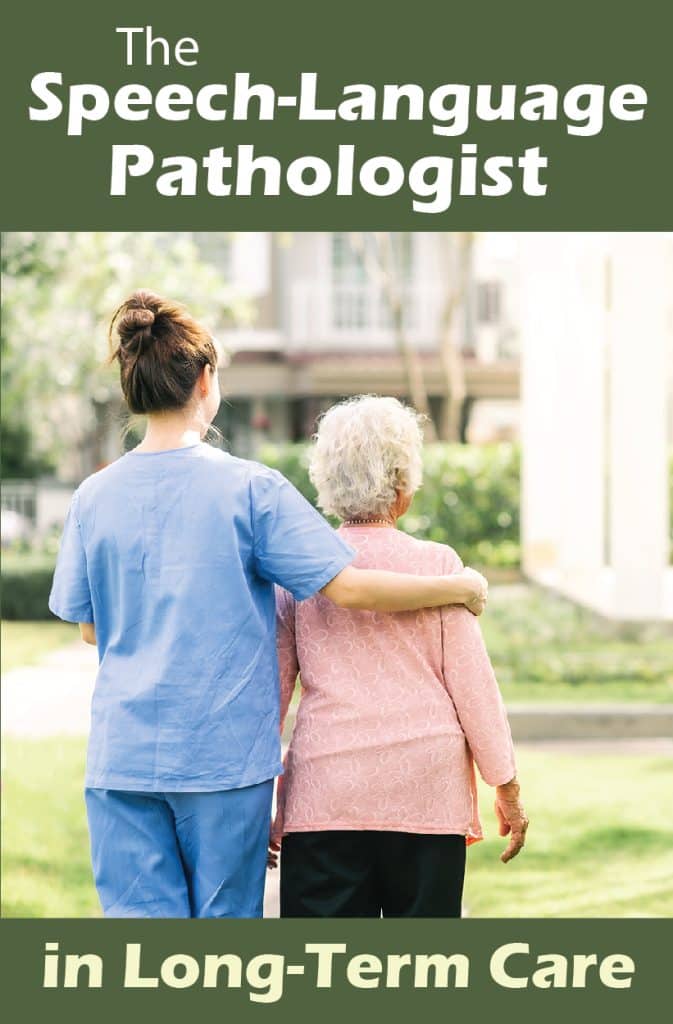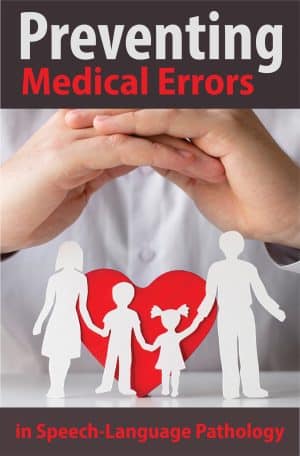- ADHD
- Adults
- Alternative Medicine
- Alzheimers & Aging
- Animal-Assisted Therapy
- Autism
- Behavior Therapy
- Child & Adolescent
- Closeout
- Communication
- Couples-Family-Parenting
- Cultural Diversity
- Depression & Anxiety
- Domestic Violence
- Ethics & Risk Management
- Gender Identity
- HIV-AIDS
- Human Trafficking
- Laws & Rules
- Medical Errors
- Mindfulness & Yoga
- Miscellaneous
- National Psychologist
- Nutrition & Fitness
- Pain Management
- Psychotherapy
- Sexuality
- Substance Abuse
- Suicide
- Supervision
- Trauma & PTSD
The Speech-Language Pathologist in Long-Term Care
Edie Deane, MS-CCC, CCM; Laura More, MSW, LCSW
Course Abstract
The Speech-Language Pathologist in Long-Term Care is a 2-hour online continuing education (CE) course that provides a framework for the SLP providing care in a skilled nursing facility.
As the population of the United States ages, more healthcare professionals find themselves treating elders. Schools, private practice, and hospitals will always be major practice settings, but the demographics of our country point to a growing need for geriatric treatment. There are about 1.7 million people in 16,700 skilled nursing facilities (CDC, 2020). By 2030 this number may be as high as 2.6 million (AoA, 2014). There is a significant need now for treatment provided by speech-language pathologists in the skilled nursing facility setting which will only grow in the years to come.
Skilled nursing facilities have unique challenges for healthcare professionals. Multiple federal regulations, a complex billing system, and the long-term nature of skilled nursing facility residents make this a setting that requires an orientation to its unique traits. A culture of care that must be learned and integrated into the clinician’s treatment habits
This course provides an overview of skilled nursing facilities as a work setting for speech language pathologists. The structure, organization, and reimbursement structure of skilled nursing facilities will be described. The average resident and common treatment areas will be discussed.
Course #21-50 | 2021 | 33 pages | 15 posttest questions
Learning Objectives
- List three rights of residents in long-term care
- Describe the average skilled nursing facility resident
- Name the top two persons in the skilled nursing facility administration structure
- Describe three safety issues in long-term care
- Describe a strategy to address unwanted behavior in a person with dementia
- List ten strategies to help reduce legal action against skilled nursing facilities
Course Directions
This online course provides instant access to the course materials (PDF download) and CE test. The course is text-based (reading) and the CE test is open-book (you can print the test to mark your answers on it while reading the course document).
Successful completion of this course involves passing an online test (80% required, 3 chances to take) and we ask that you also complete a brief course evaluation.
About the Author(s)
Edie Deane, MS-CCC, CCM : Find out More
Edie Deane, MS-CCC, is a creative leader who infuses all her work with an entrepreneurial spirit. Edie’s career spans healthcare areas from hands-on service to e-business. Her portfolio of experience includes: leadership, strategic and business development as online education company Care2Learn’s founder/owner; operations, administration, and education/training in national rehabilitation companies; and development of an e-learning department in a prominent healthcare software company. Edie currently owns ED Consulting & Coaching, focused on services for the LTPAC ecosystem.
Disclosure
Financial: No relevant financial relationships exist.
Nonfinancial: No relevant nonfinancial relationships exist.
Laura More, MSW, LCSW : Find out More
Laura More, MSW, LCSW, is a healthcare author and licensed clinical social worker. Laura was one of the founding partners of Care2Learn, a provider of online continuing education courses for the post-acute healthcare industry. She now provides healthcare authoring services. She has authored over 120 online continuing education titles, co-authored evidence-based care assessment area resources and a book, The Licensed Practical Nurse in Long-term Care Field Guide. She is the recipient of the 2010 Education Award from the American College of Health Care Administrators.
Disclosure
Financial: Laura More receives author compensation from Professional Development Resources.
Nonfinancial: No relevant nonfinancial relationship exists.
CE Information
Speech Language Pathology
Introductory Level | 0.2 ASHA CEUs | ASHA credit is available until 5/31/2026. ASHA CEUs are awarded by the ASHA CE Registry upon receipt of the monthly completion report from the ASHA Approved CE Provider (#AAUM5172). Please note that the date that appears on ASHA transcripts is the last day of the month in which the course was completed.
Professional Development Resources is CE Broker compliant (#50-1635 - all courses are reported within two business days of completion).
ASHA CE Provider approval and use of the Brand Block does not imply endorsement of course content, specific products, or clinical procedures.
Customer Testimonials
This was very updating and informative. I am a Caregiver and my adopted parents are mean and angry all the time. I am glad to be able to have the information to know it is not personal. Sometimes a little reminder is always good to have. Thanks again
Kudos to the authors! After working in Skilled Care Facilities for 50 years, and reading many articles covering a multitude of topics, this is by far the most complete, organized, realistic , comprehensive course I have yet to enjoy reading. Thank you for bringing up so many situations that the Speech Pathologists and other staff members encounter every day. This should be required reading for all staff working in Skilled and Long Term facilities!
This course furthered my knowledge of Skilled Nursing Facilities and the needs of elders.
The course was thorough and appropriate. The authors covered all of the learning objectives well and very true and relevant to practitioners working in a SNF.
I have a greater understanding of the emotions and care needed for elderly residents in long term facilities.
More Testimonials
My practice has always been with preschoolers so this information doesn't apply. But, I have just placed my 74 year old brother in a skilled nursing facility. This information has been exceptionally helpful to me. I wish I had read this course before the process began. Thank you!!!
This would be the perfect course for anyone planning to move into working in a SNF after having worked in another setting for a while. All the complexities of how a skilled nursing facility work can be very confusing at first and this course helps to explain it
In addition to addressing the rights of residents in long term care facilities, I found the content addressing safety issues regarding care, treatment for Dysphagia, respect for an individual's quality of life and support during the dying process informative and helpful.





